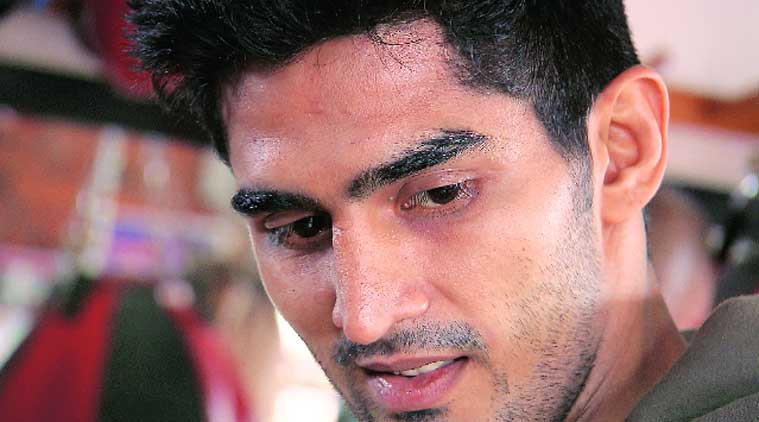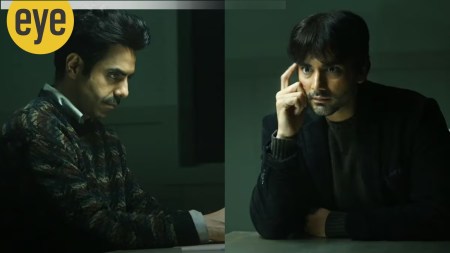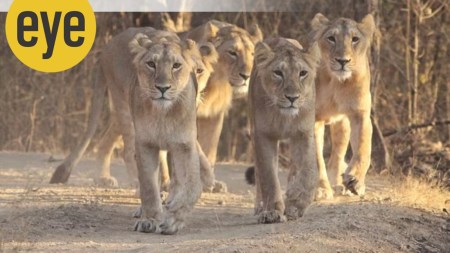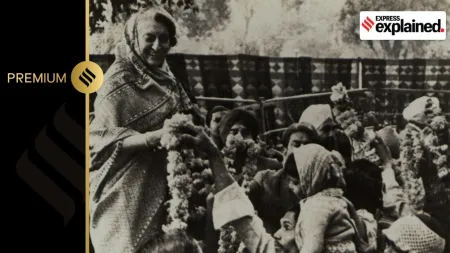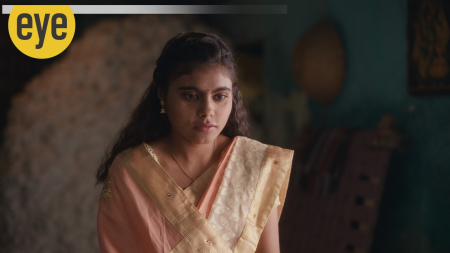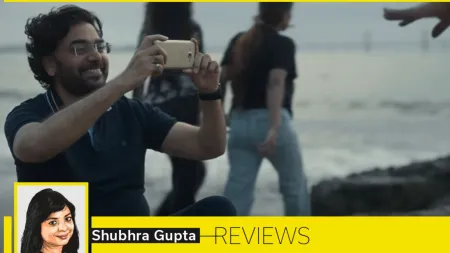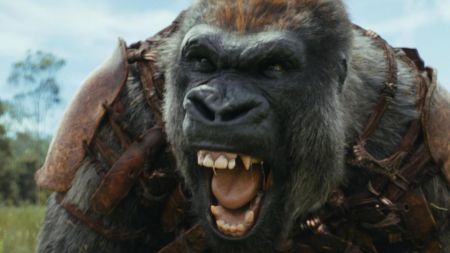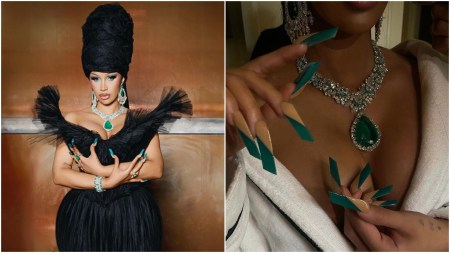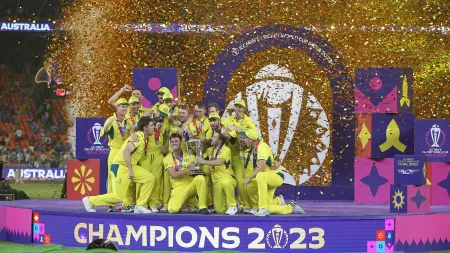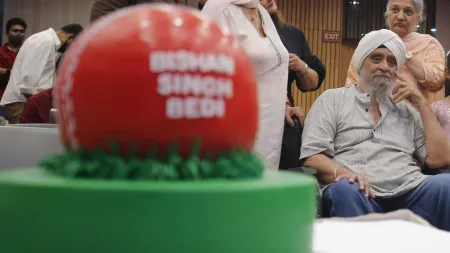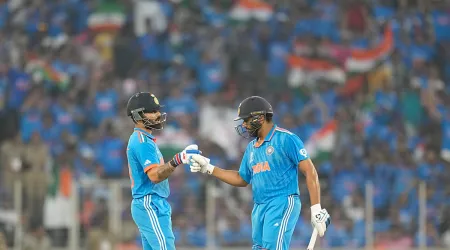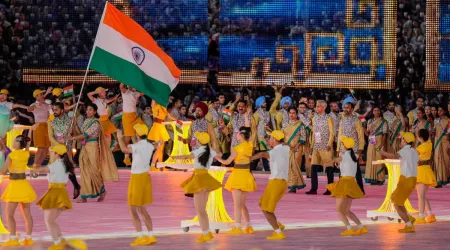- India
- International
Rocky road ahead for boxer Vijender Singh
Jonathan Selvaraj looks at the perks and pitfalls that boxer Vijender Singh will face as he embarks on his journey as a professional in Manchester.
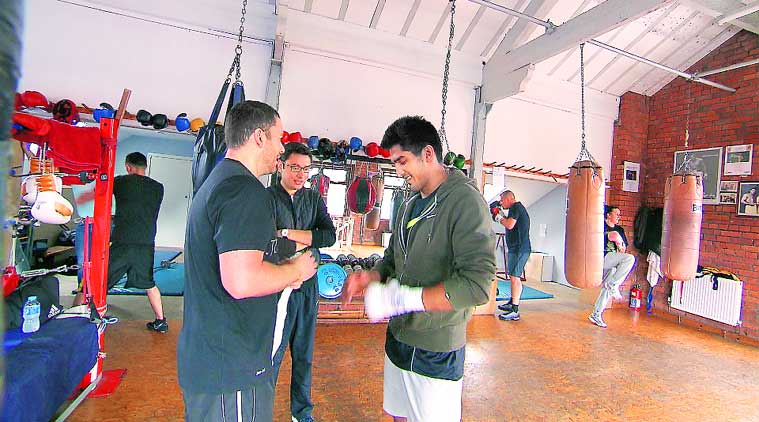 Vijender Singh announced his decision to turn professional on Monday.
Vijender Singh announced his decision to turn professional on Monday.
In the boxing movie genre, apart from the happy ending, nothing is more ubiquitous than the training montage. Over a suitably uplifting soundtrack the hero perfects his pugilistic prowess. When the music starts he is nothing. After about three minutes he emerges ready for battle. The montage from Rocky I is a classic of this trope. Set to Bill Conti’s now iconic ‘Gonna fly now’, Rocky runs through rough streets and up the steps of the Philadelphia Museum of Art. The music reaches its crescendo as he triumphantly raises his arms and jumps before heading few minutes later to a world championship bout with Apollo Creed.
The sequence would not have been unfamiliar to Vijender Singh, referred to albeit hyperbolically as the Rocky of Indian boxing. Vijender who announced his decision to turn professional on Monday, has spoken often of his love of the Rocky franchise.
Two Saturdays ago, Vijender ran his own version of Rocky’s Philly sprint – a route marked out by trainer Lee Beard, just outside Manchester in North England. The run comprised a series of steep steps down a hill to a river, up the same way then around a field and back the steps once again.
Beard had set up the circuit to test the Indian’s level of commitment. The no nonsense 40-year old Mancunian says the run challenges, both physically and mentally. It simulates to some degree the rigours of a 12-round professional bout. Speaking almost a bit gleefully, Beard describes what the run does to the unprepared. “Your heart is exploding and your legs turn to jelly. Even if you want to move them and most don’t, you can’t. I have had boxers break down,” he says.
Vijender took on the course alongside Jack Catterall, another Beard trainee. Defending his WBO light welterweight title in a few weeks, the 21-year old was in the shape of his career. Vijender in contrast was just a year shy of thirty. He had spent the previous few months completing his police exams with little training. The Indian, it appeared, had been set up for failure.

“I was surprised at the level at which he was able to train,” admitted Beard. He’d expected Vijender to complete two or perhaps three circuits of the run. A punishing hour later, Vijender completed the last of six circuits only a bit behind Catterall.
There wasn’t any accompanying music only a little voice in his head inexorably pushing him forward. No helpful passerby to toss an apple his way. There was certainly no superfight with a real-life Creed lined up. A title shot infinitely far away. Indeed as of then he wasn’t even certain to turn professional.
“When we went to Manchester on June 22, it was still uncertain whether Vijender would turn professional,” says Neerav Tomar, MD of IOS which manages the Indian. Several things needed to be in place, contract negotiations with boxing promoter Francis Warren still to be carried out. They wanted to be certain there would be an audience willing to see Vijender’s bouts. Most importantly it had to be determined whether Vijender could carry his success from the amateur world into the professional setup.
Beard, recommended by Warren, seemed to be the right man to make that call. Having made his name as a quiet backroom specialist, Beard has trained multiple professional world champions including Ricky Hatton. Many, like Dominican IBF Super Featherweight Argenis Mendez had a strong amateur background and like the Indian were from foreign lands.
Learning new tricks
Beard knew the purely technical challenges that lay ahead for the amateur making the leap; the difference akin to a Test match and a T20. “The scoring system at the amateur level means boxers throw a lot of punches with little power. There’s lot more time in professional levels. You need to strategise and break down your opponents over the course of the rounds,” says Beard. Because speed and movement are emphasized early on in their careers at the expense of power, not all amateurs can cope in the professional ranks. “Just because you won an Olympic medal doesn’t mean you will be a good professional. You might be a great boxer at range but what do you do when your opponent walks inside and starts to trade head to head,” he questions.
That’s problems aplenty for Vijender who built his amateur record as a counter-puncher. However, over Vijender’s week at Manchester, Beard’s grown steadily impressed. “I was surprised at the power he had in both his arms. He didn’t use his jab simply to maintain distance. He used it as a weapon,” Beard says.
Beard also points out a mental hurdle faced by amateurs who transition from being the big fish in a small pond to just another pro novice . “Some think they know it all and refuse to learn,” he says. Vijender, the biggest fish of all in the puddle that is Indian boxing, wasn’t resistant. “He may be a big hero back in India and acted in a Bollywood movie but he wasn’t a prima donna. There were things he was good at, and things he wasn’t but he was very willing to learn,’ says Beard.
Beard reckoned that Vijender being 29, wasn’t entirely a disadvantage. “Lads turn professional at 18, but they’re still babies then. Vijender is a young 29. He hasn’t got a lot of damage to his body. He has looked after himself well. He’s very experienced and knows how to compete,” says Beard.
And Vijender will clearly believe that. On July 12 he will be ringside to watch the WBO European Super Middleweight belt holder Frank Buglioni fight Fedor Chudinov for the WBA (Regular) Super Middleweight title .
Five years ago, Vijender had beaten the Englishman for the Commonwealth Championships gold in New Delhi. Then there’s Badou Jack, current holder of the WBC super middleweight belt, boasting a 19-1 professional record. Jack’s last amateur loss came at Vijender’s hands in the first round of the 2008 Olympics.
Both Buglioni and Jack turned pro soon after losing to the Indian giving them a headstart. But heavyweight Anthony Joshua, who had the advantage of being a homegrown gold medal winner at the London Olympics in 2012 is yet to get his first belt. The time it takes to build a reputation as a professional would have prompted Vijender to not wait till Rio when he would be 31.
As such Vijender will begin his professional career with a four round bout against a journeyman in September and slowly work his way up to 12 rounds. Multi million prize purses like those of Floyd Mayweather are unthinkable at this stage. While at some point in the future Vijender may float like a butterfly and sting like a bee, his career’s a rather crawling caterpillar the first few fights.
Selling seats
Steve Lillis, who over 24-years has established himself as one of the premier journalistic voices on British boxing, says Vijender’s first year will simply be about getting his career up and running. Getting used to preparing for a single fight at a time with eight weeks of rest, and adjusting to wearing the smaller and lighter professional gloves that make movements quicker but correspondingly hurt the fists far more when punching. Just the fact of fighting with a bare torso under the spotlight can be a new experience.
Unlike in the amateur’s you can’t escape a difficult draw to get to the top here. And while he is a long way from competing at the top, the British middleweight and super middleweight division – is about the most competitive it has been in a long time. Apart from James DeGale, who won the Olympic middleweight gold in 2008 and holds the current IBF and WBC super middleweight belts, there’s a pack of prizefighters led by Chris Eubank Jr., son of the legendary Chris Eubank and Billy Joe Saunders.
Lillis says simply winning might not be enough. Vijender will have to be able to get people off their seats. His counterpunching style effective in negating the brawling American Terrell Gausha at the London Olympics won’t win him many fans. Professional fans prefer a more come forward approach. “He will have to find a style that’s fan friendly and TV friendly. (Cuban) Guillermo Rigondeux is one of the best boxers in the world right now but struggles to get any bookings in the USA because he isn’t seen as exciting enough,” says Lillis.
Over the next month, Beard says Vijender will relearn some techniques. “We’ll focus on his defence, teach him how to slip past punches and get comfortable fighting inside the pocket,” he says.
Then there are challenges outside the ring. Even dealing with gloomy Manchester, one of the rainiest cities in England, can be a handful. “Professional boxing is a selfish and lonely sport. It’s going to be hard for Vijender to come from a setup where everything is taken care off, always been surrounded by family and friends. He will have to get used to another culture. When his training partners go home to their families, Vijender will have to go to an apartment and fend for himself,” says Lillis.
Keeping all this in mind, Beard reckons, Vijender’s decision to turn professional is a gutsy one. “It might have been easier for Vijender to simply go to Rio where he’d know the competition he’d face. Here many of the things he will be doing will be unknown to him,” he says. Lillis agrees. “Its hard to give up a steady Police job, the security of already being a legend in his own right and do something which may upset some people. Professional boxing needs courage and Vijender clearly has it,” he says.
Another Amir Khan?
If on Wednesday, Francis Warren, scion of the legendary Frank Warren – perhaps the greatest boxing promoter in Europe who once managed the careers of multiple world title holder Naseem Hamed and Amir Khan – went house hunting for the Indian in Manchester it was for a simple reason. Selling tickets is as important as the sport, and Vijender can put bums on seats.
“Vijender is personable, funny, enjoys interacting with the media, handsome. In short he is a promoter’s dream. He has a huge following, very easy to market. He’s a very likeable guy. He has a young family,” says Warren. “He ticks every box.”
Warren has made no secret that he ultimately targets a bout for Vijender in India at some point, and is expected to make a visit to the country next month to woo sponsors to feature on Vijender’s shorts and arrange telecast rights for his debut bout. However until the ‘Indian market’ fetches up, Vijender will have to make a name for himself in Britain.
Apart from the usual crowd, Shamir Masri, a Sheffield based boxing journalist of Gujarati heritage, says Vijender can grab a significant share of a hitherto untapped audience. “Many British people of Indian descent have an interest in boxing but British Indians haven’t had a lot of success in it. The British Pakistani community tends to produce a lot more boxers. There’s significant rivalry between the two communities so while there is some pride in (current WBC silver welterweight champion) Amir Khan, as a British Indian it is far more strained,” says Masri.
“From a British Indian perspective, there is massive excitement and expectation that in 12 to 18 months, Vijender will be mentioned in the same breath as Amir Khan. People realize how big this can be,” say Masri.
Tomar too seems confident. “The British Indian community rallies around Indian sportspersons. A couple of years back when the Indian national football team played a couple of games with Fulham, some 10,000 British Indians came too see perhaps the worst football of their lives,” he jokes. “With Vijender, they are going to get a world class show,” he promises.
Allowing himself to dream, Tomar, sees Vijender progressing quickly and perhaps after a couple of years, making the move to the even bigger boxing market of USA. Competing even for world titles.
In the real world though potential pitfalls abound. His career has to be shaped perfectly, with expectations carefully managed There can be no setbacks. A loss early in his career could prove fatal to his prospects in a sport that fetishizes the undefeated tag. And of course Vijender hasn’t any chance of getting away from the grueling training that he underwent at Beard’s academy last week, with no guarantee of success. Real life unfortunately, doesn’t have the concept of a training montage even if there is hopes for a Hollywood movie like ending.


